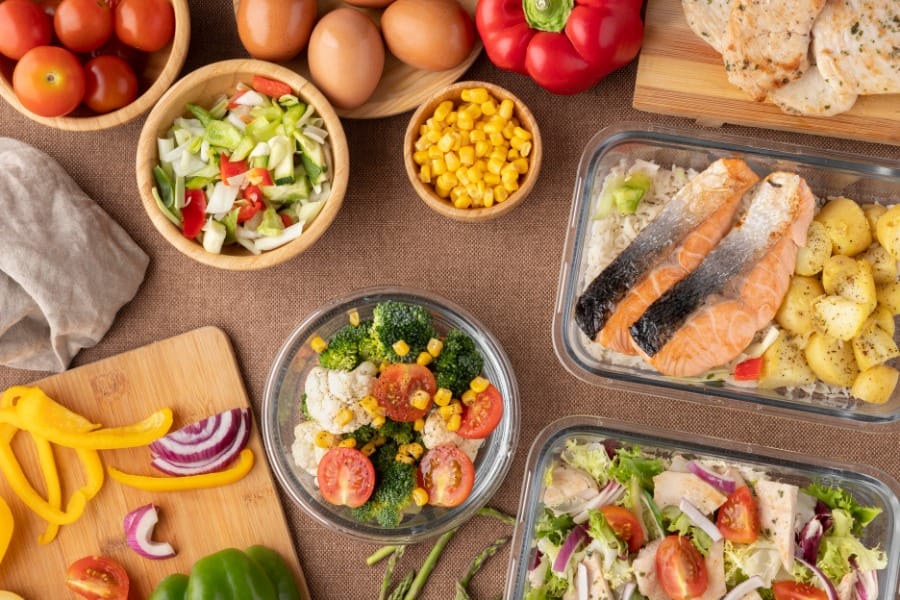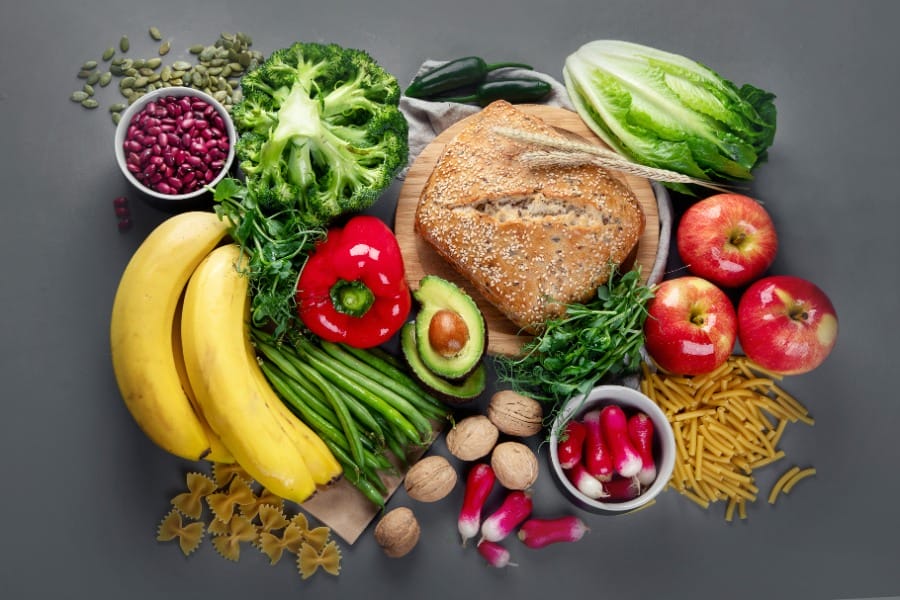Foods to Avoid with Parkinson’s Disease
Living with Parkinson’s disease can be challenging, but proper nutrition can help you manage symptoms and improve your quality of life.
As someone with Parkinson’s, you may have questions about what foods to eat and what foods to avoid.
In this comprehensive guide, we’ll explore the role of nutrition in Parkinson’s disease management, discuss protein-medication interactions, highlight high-fiber foods, and provide strategies for navigating dietary restrictions while maintaining a healthy diet.
By the end of this article, you’ll have a better understanding of how to create a balanced, Parkinson’s-friendly diet that supports your overall health and well-being.
How Nutrition Impacts Parkinson’s Disease Management

Proper nutrition plays a crucial role in managing Parkinson’s disease symptoms and supporting overall health.
Working closely with your healthcare provider or a registered dietitian can help you create a personalized meal plan that meets your unique needs.
A well-balanced diet can improve energy levels, support digestive health, and optimize medication effectiveness, all of which contribute to a better quality of life.
Important Note: While many of the same principles for a healthy diet for individuals with Parkinson’s Disease may reflect other diets, this is not intended for weight loss. Rather, these are strictly dietary suggestions for individuals with Parkinson’s Disease to promote overall wellness and brain health.
Getting Enough Protein
Protein is essential for building and repairing tissues, but it can also interact with Parkinson’s medications like levodopa.
To optimize medication absorption, it’s important to time your protein intake carefully. Consider consuming most of your protein at dinner, when your medication is less likely to be affected.
You can also discuss protein redistribution with your healthcare team to find a schedule that works best for you.
High-Protein Foods to Limit or Avoid with Parkinson’s Disease
To minimize interference with levodopa absorption, you may need to limit or avoid certain high-protein foods.
Foods we recommend limiting include:
1. Red meat, such as beef and pork
2. Processed meats, like ham and bacon
3. Beans and legumes
4. Nuts and seeds
5. Soy products, like tofu and tempeh
Instead, opt for alternative protein sources that are less likely to impact medication efficacy, such as eggs, fish, and low-fat dairy products.
The Importance of Fiber for Digestive Health
Fiber is essential for promoting regularity and preventing constipation, a common non-motor symptom of Parkinson’s disease.
To keep your digestive system running smoothly, incorporate these high-fiber foods into your diet:
1. Whole grains, like brown rice and quinoa
2. Fresh fruits, such as berries and apples
3. Vegetables, like broccoli and spinach
4. Legumes, such as lentils and chickpeas
5. Nuts and seeds, in moderation
Remember to drink plenty of water to help fiber work its magic and keep you hydrated.

Dairy Products: Pros and Cons
Dairy products can be a valuable source of calcium and vitamin D, but they may also cause digestive issues and symptoms worse for some people with Parkinson’s.
If you tolerate dairy well, choose low-fat options like skim milk, yogurt, and cottage cheese. If you’re sensitive to dairy, consider plant-based alternatives such as almond milk or soy yogurt.
Talk to your healthcare provider about calcium and vitamin D supplementation if you avoid dairy completely.
Tyramine: A Hidden Culprit
Tyramine is an amino acid derivative found in certain foods that can interact with MAO inhibitors, a type of Parkinson’s medication.
To avoid dangerous blood pressure spikes, limit or avoid these tyramine-rich foods:
1. Aged cheeses, like Stilton and Camembert
2. Cured meats, such as pepperoni and salami
3. Pickled foods, like sauerkraut and kimchi
4. Overripe fruits, such as bananas and avocados
5. Fermented beverages, like beer and wine
If you’re unsure about a particular food, consult your healthcare provider or dietitian for guidance.
Ensuring Adequate Nutrition
Maintaining a balanced diet with healthy foods while managing Parkinson’s disease can be challenging, but as we have discussed it is essential for overall health and well-being. It is important to avoid fad diets or unhealthy, salty foods.
To ensure adequate nutrition, we highly suggest the following steps:
1. Eat a variety of foods from all food groups
2. Choose nutrient-dense options, like fruits, vegetables, and whole grains
3. Stay hydrated by drinking plenty of water throughout the day
4. Consider supplements to address specific nutrient deficiencies, under the guidance of your healthcare provider
Remember, everyone’s nutritional needs are different, so work closely with your healthcare team to develop a plan that’s right for you.
Navigating Drug-Food Interactions

Parkinson’s medications can interact with certain foods, affecting absorption and efficacy. Some common drug-food interactions include:
- Levodopa and protein-rich foods
- MAO inhibitors and tyramine-rich foods
- Entacapone and iron supplements
To minimize adverse interactions, follow these strategies:
1. Take medications on an empty stomach, or as directed by your healthcare provider
2. Wait 30-60 minutes after taking medication before eating
3. Avoid consuming large amounts of problematic foods in one sitting
4. Keep a food diary to track potential interactions and discuss them with your healthcare team
Gastrointestinal Health and Parkinson’s Disease
Parkinson’s disease can affect the entire gastrointestinal tract, leading to symptoms like constipation, bloating, and reflux. To support digestive health:
1. Eat plenty of fiber-rich foods, like fruits, vegetables, and whole grains
2. Drink enough water to keep stools soft and easy to pass
3. Exercise regularly to stimulate bowel movements
4. Consider probiotic supplements to support beneficial gut bacteria, under the guidance of your healthcare provider
If digestive issues persist, talk to your doctor about additional treatment options.
Symptom Management Through Diet
While there’s no one-size-fits-all diet for Parkinson’s disease, certain dietary choices may help manage specific symptoms. However, there are steps you can take for major and secondary symptoms related to Parkinson’s Disease.
For example:
- Eating smaller, more frequent meals can help with nausea and appetite loss
- Choosing soft, easy-to-chew foods can make eating easier if you experience tremors or difficulty swallowing
- Limiting caffeine and alcohol can improve sleep quality and reduce anxiety
Experiment with different foods and eating patterns to find what works best for managing your unique symptoms.
Did You Know: There is ongoing research regarding the relationship between Parkinson’s Disease and nutrition. One current area of study is the potential neuroprotective effects of specific nutrients, like omega-3 fatty acids and antioxidants.
Managing Dietary Restrictions
If you have additional dietary restrictions, such as gluten sensitivity or lactose intolerance, managing your diet with Parkinson’s disease can feel overwhelming.
However, with careful planning and a little creativity, you can still enjoy a balanced, nutritious diet. Some tips for managing dietary restrictions:
1. Focus on whole, unprocessed foods that naturally fit your dietary needs
2. Seek out specialty products, like gluten-free bread or lactose-free milk
3. Work with a registered dietitian to develop a meal plan that accommodates your unique needs
Remember, you don’t have to navigate dietary restrictions alone. Reach out to your healthcare team for guidance and support.
Eating Out and Traveling with Parkinson’s Disease
Eating out and traveling with Parkinson’s disease can be challenging, but with a little preparation, you can still enjoy meals away from home. Some strategies for dining out and traveling:
1. Research restaurants in advance to find Parkinson’s-friendly options
2. Communicate your dietary needs to restaurant staff or travel companions
3. Pack snacks and medications to ensure you have what you need on hand
4. Plan ahead for time zone changes and medication schedules
By being proactive, you can minimize stress and enjoy meals in new environments.
Get the Best Parkinson’s Care
Managing your diet is a crucial aspect of living well with Parkinson’s disease. By focusing on a balanced, nutrient-rich diet that includes plenty of fruits, vegetables, whole grains, lean proteins, and healthy fats, you can support your overall health and potentially alleviate some of the symptoms associated with Parkinson’s.
However, navigating dietary changes can be challenging, especially when dealing with the physical and emotional toll of the disease.
This is where NurseRegistry can make a significant difference in your life.
With a team of highly specialized, licensed, and caring nurses available 24/7, NurseRegistry offers the support and expertise you need to manage your Parkinson’s disease effectively. Whether you require assistance with meal planning, medication management, or general care, NurseRegistry’s experienced nurses are here to help.
By choosing NurseRegistry for your private nursing needs, you’ll benefit from personalized care tailored to your unique requirements, flexible scheduling that adapts to your lifestyle, and the peace of mind that comes with knowing you’re in the hands of a qualified professional.
With NurseRegistry’s commitment to patient privacy and quick response times, you can focus on what matters most – your health and well-being.
Don’t let Parkinson’s disease control your life.
Take charge of your nutrition and overall care by partnering with NurseRegistry today. With their dedicated support and expertise, you can navigate the challenges of Parkinson’s disease with confidence and live your best life possible.
People Also Ask – Parkinson’s Disease Foods to Avoid
Which specific food ingredients should individuals with Parkinson’s disease avoid?
Individuals with Parkinson’s disease should avoid foods that contain high levels of saturated fats, trans fats, and cholesterol. These types of foods can increase the risk of heart disease and stroke, which are already elevated in Parkinson’s patients. Additionally, some studies suggest that high levels of these types of fats may also increase inflammation in the body, which can worsen Parkinson’s symptoms.
What foods make Parkinson’s worse?
There is no definitive answer to what foods make Parkinson’s worse, as individual reactions can vary. However, some people with Parkinson’s may find that certain foods or drinks exacerbate their symptoms. For example, some people may find that caffeine, alcohol, or spicy foods can increase tremors or worsen balance problems.
Are there certain fruits or vegetables that can exacerbate Parkinson’s symptoms?
There is no definitive answer to this question, as individual reactions can vary. However, some people with Parkinson’s may find that certain fruits or vegetables exacerbate their symptoms. For example, some people may find that citrus fruits or tomatoes can increase tremors or worsen balance problems.
Are eggs bad for Parkinson’s disease?
There is no definitive answer to whether eggs are bad for Parkinson’s disease. Some studies suggest that high levels of dietary cholesterol may increase the risk of Parkinson’s disease, but other studies have found no association between egg consumption and Parkinson’s disease risk. Individuals with Parkinson’s disease should talk to their doctor or a registered dietitian about their individual dietary needs.
What dietary changes can help manage inflammation in Parkinson’s patients?
Some dietary changes that may help manage inflammation in Parkinson’s patients include eating a diet rich in fruits, vegetables, whole grains, lean protein, and healthy fats, such as those found in nuts, seeds, and fatty fish. Additionally, limiting processed foods, sugar, and saturated and trans fats may help reduce inflammation.
Can certain diets or foods influence the progression of Parkinson’s disease?
There is no definitive answer to whether certain diets or foods can influence the progression of Parkinson’s disease. Some studies have suggested that a Mediterranean-style diet, which is rich in fruits, vegetables, whole grains, lean protein, and healthy fats, may be beneficial for brain health and may help reduce the risk of Parkinson’s disease. However, more research is needed to determine whether specific dietary patterns or foods can slow or halt the progression of Parkinson’s disease.
Is there a recommended meal plan or diet that benefits those with Parkinson’s disease?
There is no one-size-fits-all recommended meal plan or diet for individuals with Parkinson’s disease. However, some general dietary guidelines that may be beneficial for Parkinson’s patients include eating a diet rich in fruits, vegetables, whole grains, lean protein, and healthy fats, such as those found in nuts, seeds, and fatty fish. Additionally, limiting processed foods, sugar, and saturated and trans fats may help reduce inflammation.
How does protein intake affect medication efficacy in Parkinson’s disease treatment?
Protein intake can affect medication efficacy in Parkinson’s disease treatment. Some Parkinson’s medications, such as levodopa, are absorbed more slowly when taken with protein-rich foods, such as meat or dairy products. To ensure that medications are absorbed properly, individuals with Parkinson’s disease may need to time their medication doses around meals and limit their protein intake at certain times of the day. Parkinson’s patients should talk to their doctor or a registered dietitian for individualized recommendations.
Additional Resources and Support
For more information and support in managing Parkinson’s disease through diet and lifestyle changes, check out these reliable resources:
1. The Michael J. Fox Foundation for Parkinson’s Research
2. The Parkinson’s Foundation
3. The Davis Phinney Foundation
4. The American Parkinson Disease Association
The post Foods to Avoid with Parkinson’s Disease appeared first on NurseRegistry.
from NurseRegistry https://ift.tt/T7fwXYN

Comments
Post a Comment